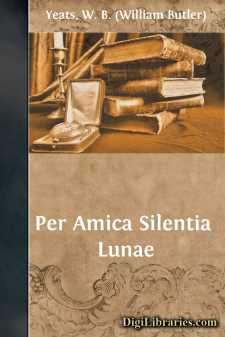Categories
- Antiques & Collectibles 13
- Architecture 36
- Art 48
- Bibles 22
- Biography & Autobiography 813
- Body, Mind & Spirit 141
- Business & Economics 28
- Children's Books 12
- Children's Fiction 9
- Computers 4
- Cooking 94
- Crafts & Hobbies 4
- Drama 346
- Education 46
- Family & Relationships 57
- Fiction 11826
- Games 19
- Gardening 17
- Health & Fitness 34
- History 1377
- House & Home 1
- Humor 147
- Juvenile Fiction 1873
- Juvenile Nonfiction 202
- Language Arts & Disciplines 88
- Law 16
- Literary Collections 686
- Literary Criticism 179
- Mathematics 13
- Medical 41
- Music 40
- Nature 179
- Non-Classifiable 1768
- Performing Arts 7
- Periodicals 1453
- Philosophy 64
- Photography 2
- Poetry 896
- Political Science 203
- Psychology 42
- Reference 154
- Religion 513
- Science 126
- Self-Help 83
- Social Science 81
- Sports & Recreation 34
- Study Aids 3
- Technology & Engineering 59
- Transportation 23
- Travel 463
- True Crime 29
Per Amica Silentia Lunae
Description:
Excerpt
ANIMA HOMINIS
I
When I come home after meeting men who are strange to me, and sometimes even after talking to women, I go over all I have said in gloom and disappointment. Perhaps I have overstated everything from a desire to vex or startle, from hostility that is but fear; or all my natural thoughts have been drowned by an undisciplined sympathy. My fellow-diners have hardly seemed of mixed humanity, and how should I keep my head among images of good and evil, crude allegories.
But when I shut my door and light the candle, I invite a Marmorean Muse, an art, where no thought or emotion has come to mind because another man has thought or felt something different, for now there must be no reaction, action only, and the world must move my heart but to the heart’s discovery of itself, and I begin to dream of eyelids that do not quiver before the bayonet: all my thoughts have ease and joy, I am all virtue and confidence. When I come to put in rhyme what I have found it will be a hard toil, but for a moment I believe I have found myself and not my anti-self. It is only the shrinking from toil perhaps that convinces me that I have been no more myself than is the cat the medicinal grass it is eating in the garden.
How could I have mistaken for myself an heroic condition that from early boyhood has made me superstitious? That which comes as complete, as minutely organised, as are those elaborate, brightly lighted buildings and sceneries appearing in a moment, as I lie between sleeping and waking, must come from above me and beyond me. At times I remember that place in Dante where he sees in his chamber the “Lord of Terrible Aspect,” and how, seeming “to rejoice inwardly that it was a marvel to see, speaking, he said, many things among the which I could understand but few, and of these this: ego dominus tuus”; or should the conditions come, not as it were in a gesture—as the image of a man—but in some fine landscape, it is of Boehme, maybe, that I think, and of that country where we “eternally solace ourselves in the excellent beautiful flourishing of all manner of flowers and forms, both trees and plants, and all kinds of fruit.”
When I consider the minds of my friends, among artists and emotional writers, I discover a like contrast. I have sometimes told one close friend that her only fault is a habit of harsh judgment with those who have not her sympathy, and she has written comedies where the wickedest people seem but bold children. She does not know why she has created that world where no one is ever judged, a high celebration of indulgence, but to me it seems that her ideal of beauty is the compensating dream of a nature wearied out by over-much judgment. I know a famous actress who in private life is like the captain of some buccaneer ship holding his crew to good behaviour at the mouth of a blunderbuss, and upon the stage she excels in the representation of women who stir to pity and to desire because they need our protection, and is most adorable as one of those young queens imagined by Maeterlinck who have so little will, so little self, that they are like shadows sighing at the edge of the world....












